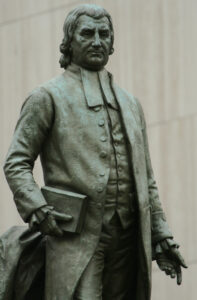Americanism Redux
December 7, 250 years ago today
Yes-To-Tom.
Yes(terday) – To(day) – Tom(orrow)
Yesterday. Today. Tomorrow.
Time in sequence as you live it and know it/as it comes, stays, and goes/as you were, is, and will be.
Yes-To-Tom.
Yesterday, a ship captain named Prince made himself at home as best he can along the docks of New York City. He collected his thoughts in his head for the story he wanted to tell. God Almighty, it’s hard to focus after almost sixty days at sea, sailing a beaten-up and storm-damaged ship into New York harbor. Today, he tells the story to anyone who’d listen, the story of another ship commander—Steel was his name—and how Steel told of a French ship near the Caribbean Sea carrying Africans into slavery there. The Africans enchained below deck had revolted, seized the ship, and were cruising the Caribbean firing on other vessels. Steel said another ship, launched from Scotland, had also been the scene of an uprising by enslaved Africans who killed every white man on board except for one child. This ship of rebellious Africans had clashed with a vessel and fought for four hours before being captured. It was a red ocean for certain, said Prince. Tomorrow, Captain Prince, his name now known around the docks for the story told of Steel, will be in the market to command a ship outward bound, be it east or south. If it’s a slave-transporting vessel, he’ll think twice about accepting the job.
(a ship in better shape than Captain Prince’s)
Yesterday, Mary excitedly told her husband Joseph she couldn’t wait for the miracle of her life. She’d already stood in front of a church congregation and openly declared her commitment to God and Jesus Christ. Today, Mary takes her first communion, sipping from a cup, chewing a piece of bread, closing her eyes and stating the Lord’s Prayer. A wondrous feeling for mother to know she’s joined their daughter, Unice, in religious faith. Tomorrow, Mary and Joseph and Unice will continue their lives on Long Island, New York as the enslaved property of a family. They have no last name, though the preacher from their local congregation refers to Joseph as “an Indian” in his church records. A black mother, a native father, a mixed race child. A family of no last name in a place where everybody knows your name.
(a colonial era home on Long Island)
Yesterday, a man on horseback rode into New York looking for the printer of the New York Gazette. He handed the printer a letter. Today, the printer of the New York Gazette arranges the metallic letters of his printing press to depict the written words of the letter. Tomorrow, a hundred or so readers will scan the pages of the new edition and read that the president of the College of New Jersey, John Witherspoon, a critic of British imperial policy, should stop encouraging his students to talk about politics. If not, the letter-writer warns, local students will be as much of an obnoxious nuisance as their counterparts in Boston, and nobody wants that. “The Students in the public Exhibitions,” the writer lamented, “have very often entered deeply into the Party Politics and Contentions of England, both in former and latter times, and in such manner as to give the greatest Offence to many who were present.”
(John Witherspoon, president of future Princeton University)
Also
Yesterday, she was weak. Today, her eyes go blank. The skin cools, then chills to cold. Arms and legs stiffen as the dark overtakes the light. It is night in Salem, Massachusetts. Tomorrow, someone will start to scratch the frozen earth to begin the burial of eighty-eight-year old Sarah Carrier Chapman.
In the eighty-eight years of time that the earth spun around the sun, Sarah had seen and done much. She’d seen the colony of Massachusetts evolve from a dominant religious orientation into more of a secular, money-making culture. She’d seen real-time threats of Native tribal attacks on the colony’s borders shift to the colony’s participation and leadership of military service in British-French wars. She’d seen the rise of colonial protests against British policies after the biggest British-French clash from 1754 to 1763. She’d heard of Salem Custom House and its busy seaborne trade with Europe, down the American coast, to the Caribbean and even to Africa. Through her life Salem and Massachusetts had journeyed from outpost to colony, from edge to empire.
Yet it was her deeds as a seven-year old that echoed through the dark chambers.
Sarah was one of the most notorious participants in the Salem witch trials of 1692. It was Sarah who had been accused of witchcraft, along with her three siblings. Under pressure of interrogation, Sarah had deflected the accusation by insisting that her mother had baptized her into the Devil, not God and Jesus Christ. Accusers quickly shifted to her mother, who was tried, convicted, and hanged to death. Sarah and her siblings were imprisoned. Released, Sarah later went on to marry John Chapman and together they had eleven children. John had died almost thirty years ago.
The family’s only link to the horrors of the witches was now gone.
Yes-To-Tom.
(a Salem cemetery from the era of the trials)
For You Now
It’s said that history has an arc. It might. But the arc can be narrow and the arc can have a descent, as all arcs do. Maybe it’s better to say that time has a trail. Better yet, as you know, the trail is a River and with all of the things that a River truly means.
The African men, women, and children on board the two enslaver ships weighed the course of Yes-To-Tom. They determined that now was the revolution because their world on the vessels was a lot smaller and capable of spanning than any world that awaited on dry land. Once there, a system swallowed them up but on the decks above the deep and the sharks that followed them, they stood a chance, a fighting chance.
The family-without-a-last-name didn’t have a ship and didn’t have an ocean beyond the one that lapped up on the rocks and pebbles from the Sound. Instead, they lived on the land and in the system. Yes-To-Tom for them was a new way of living above the misdeeds and mistakes of people around them.
The students who might upset some readers by listening to their college president had a pair of prisms to see through. One would be their peers elsewhere, especially in that rabble-rousing town. The other would be their peers from before, who in earlier tensions had stepped forward to push for change, for a deflection of the arc of continuation. Yes-To-Tom was a moving target at the end of a scope.
Beyond them all was the example of eighty-one years. That’s the passage of time from when Sarah was seven in the witness box to eighty-eight in the coffin box. What would she say to herself about the time that passed? About the River flowing over the rocks for four-score and one? Who among them—the two ships in revolt, the family-without-a-last-name, the students—would listen to the words that Sarah told herself?
Forgiveness is the only arc that keeps rising.
Suggestion
Consider forgiveness as done by the one and as done by the many.











